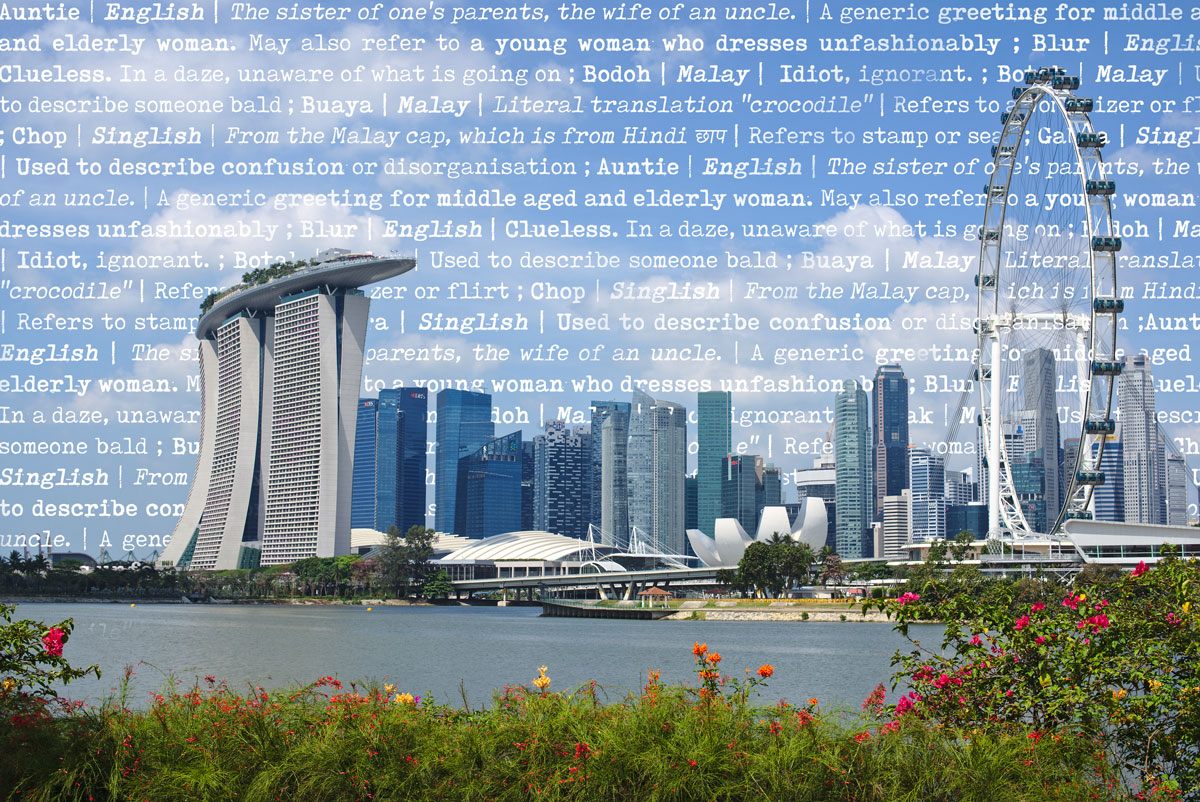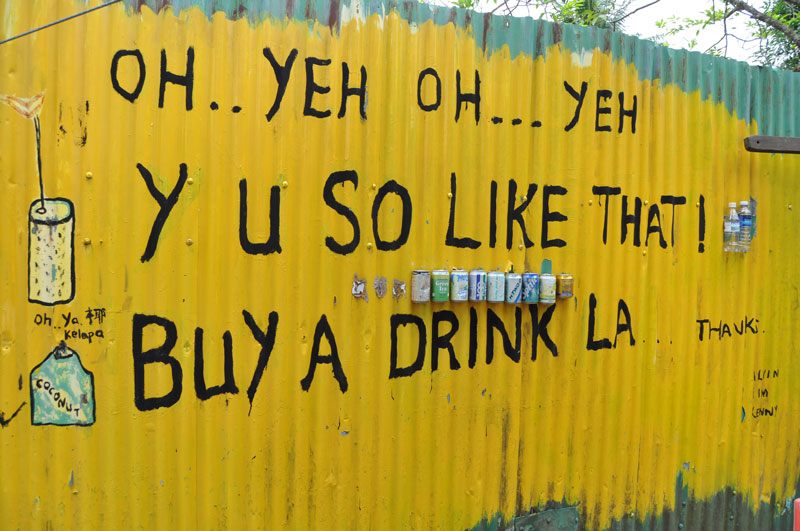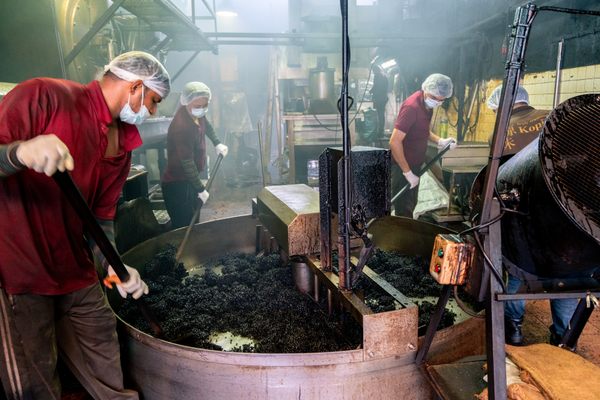The Government Campaign to Get Rid of Singapore’s Unofficial Language
Singlish, a creole, is spoken all over the country, but politicians want citizens to “speak good English.”

Imagine that the language you speak with your friends, with your family, with people on the street, a language unique to your country and objectively very interesting and cool, is, officially, considered lesser and unworthy. This kind of thing has happened around the world throughout history: African-American Vernacular English (AAVE) speakers in the United States, for example, have also had their language marginalized and demeaned by the ruling power. Now, it’s happening in Singapore.
Singapore is an immigrant country with four official languages: English, Malay, Tamil, and Mandarin. Officially, English is the most commonly spoken language in Singaporean homes, having recently and just barely edged out Mandarin. Unofficially? That’s completely wrong. Because what’s likely the actual most common language spoken does not appear on the census. That language is called Singlish.
Singlish can broadly be categorized as a creole, which is a full language that arises suddenly, usually with one language as its base, but with unique grammatical features and many words from at least one other language. This kind of language comes about when people who don’t speak the same language are suddenly living in the same place. Many creoles came from the slave trade: one person speaks one language, another speaks a second language, and they’re both moved to a place where they have to work together and live together and communicate. The base language is usually the language of the ruling class or imperial power; it’s a language that those two slaves need to understand a little, but they bring elements of their own languages into it. At first, this kind of language is classified as a pidgin, which is sort of a shorthand that exists solely for necessary communication alongside other full languages. But in some cases, it evolves into a full language of its own, one that can handle all the tasks any other language handles, at which point it’s called a creole.
Singlish has its base in English, because Singapore was a British colony for most of its modern history. But the vast majority of the population came from countries where English was not the dominant language, mostly mainland China, Malaysia, and India. Thus Singlish was born.

“Singlish itself, in its full-blown version, can get quite hard to understand [for non-Singaporean English speakers],” says Jakob Leimgruber, a sociolinguist and assistant professor who wrote his thesis on Singlish. Singaporeans are rarely monolingual, and conversations can often include bits and pieces, or full sentences, in multiple languages, which can make trying to isolate Singlish a bit tricky. But, despite the fact that Singapore is made up of multiple ethnic groups who speak different languages, Singlish itself is “remarkably consistent,” says Leimgruber, across the entire populace.
At least, it’s consistent across all ethnic groups. Socioeconomically, it’s more likely that poorer and/or older Singaporeans would speak Singlish more often; younger and wealthier Singaporeans are more likely to be able to switch between Singlish and more widely understood varieties of English. But Leimgruber says that few, if any, Singaporeans would be completely unfamiliar with Singlish, largely due to the country’s compulsory military service, which places people from all economic backgrounds together.
The language includes lots of loanwords from the other major languages spoken in Singapore, especially Mandarin, Malay, and Tamil. These are really, really common, to the point where sometimes it can sound as if the speaker has simply switched languages mid-thought. And there are some pronunciation things; words that end with a lot of consonants, for example, tend to get simplified, so a word like “texts” would be pronounced more like “tex.” But it gets much more interesting than that; it has a whole mess of totally distinct grammatical features that make it unusual.
An easy one to understand is the word “lah,” which is what’s known in linguistics as a tag. It’s attached, often but not exclusively, to the end of sentences. It’s roughly similar to the Canadian “eh,” and various other English words or phrases used around the world (“right,” “you know,” “innit”). It is ubiquitous in Singapore, as associated with Singlish as the Canadian “eh” is with Canada, although interestingly there is no pause between the end of the sentence and “lah,” as there is with “eh.” Imagine it as just…not having a comma. “So you’d just race into it lah”? Singlish has so, so many of these lightly modifying tags: leh, mah, lor, hor, har, ar. They all convey slightly different things about the relationship between the speaker and listener, or the way the speaker wants the listener to interpret what was just said.
Singlish speakers use the present tense when referring to people who are alive, or probably still alive. In English, you might say, “I went to Thailand last year, and the guide spoke fluent Spanish.” In Singlish, it would be, “the guide speaks fluent Spanish.” The thinking is that the guide continues to speak Spanish; whether you are in Thailand does not affect the guide’s ability to speak Spanish.
Then there’s the word “kena,” which is pronounced something like “kih-NAH.” There are words like this in Asian languages such as Malay and Hokkien, but not really in English. It’s a grammatical word used to mark the passive and usually right before or even instead of a verb; it means something, some verb action, happened to the subject of the sentence. Interestingly, it’s only ever used for negative things; you could say “the teacher kena scolded him,” but not “the teacher kena praised him.” “Tio” is similar, though it can be used for positive actions as well, like “She tio money on the ground.”
The English word “then” has, in Singlish, been changed to “den,” and its meanings have been pretty radically changed. It can be used to describe an action that will happen in the future, as in ”I den talk to you.” It can be used in about a dozen other ways, meaning “therefore,” as a link to a previous sentence, or alone as a sarcastic sort of “oh yeah?” meaning. The pronunciation might subtly change as well, by lengthening or dragging out the final consonant, to indicate the way in which the word is being used.
“Den” is one of many examples of ways in which Singlish sort of sounds like English, but actually packs a whole other bunch of meanings into it. If you were to just translate “den” as “then,” you wouldn’t really be getting it; you can’t use “den” in some places you’d use “then,” and vice versa, and it sometimes means something other than what “then” would mean.

Singlish also uses a lot of reduplication, which is repeating the same word. English doesn’t do this much; it might have a phrase like “very, very big,” in which the repetition is used to amplify the word “very.” “Very, very big” is even bigger than “very big,” which is bigger than “big.” In Singlish, that’s not at all how reduplication works. Take a sentence like this: “Your son short short.”
For one thing, that’s not a typo; Singlish, like Hebrew and a few other languages, simply doesn’t use the verb “to be.” (Singlish also often omits articles like “the” and “a/an.”) But the reduplication thing: “short short” doesn’t mean “very short.” Instead the reduplication of the word is a dampener, taking the whole phrase to something more like “short-ish.” This kind of reduplication can be used with both adjectives and verbs; you can take a walk walk, which would be a very mild stroll.
Anyway, that’s just a brief survey, and it might even underplay exactly how different from English Singlish really is. Leimgruber says Singlish is mostly mutually comprehensible with English, but I’m not so sure. Take a look at the Singlish dub of Beauty and the Beast.
Singlish is spoken across all ethnic groups in Singapore, even across economic strata. But the government hates it. Since the year 2000, the Singaporean government has been conducting a campaign called the “Speak Good English Movement,” which is specifically designed to discourage the use of Singlish and encourage the use of standard English.
Interestingly, the Singaporean government does not have a firm definition of what “standard English” means; they aren’t strictly teaching British Received Pronunciation or New England Prep School English or Australian English or anything else. By “standard,” they seem to simply mean “English that can be readily understood by English speakers outside Singapore.”
The campaign is not overtly violent or racist in the same way marginalization of Irish Gaelic or AAVE speakers was and is. The Singaporean government does outreach, posting signs around public transit telling people the “correct” way to pronounce words, hosting writing competitions for kids in school, that kind of thing. “These words are very similar and many often get them confused, but do you know when it’s more appropriate to use a particular word? Put your grammar skills to the test and see how you fare!” reads one quiz. Is it “The mother put her children to sleep at night” or “the mother put her children to bed at night”?
The government’s reasoning is that English is the international language of commerce, and that Singapore has an inherent advantage because, it being a former British colony, English is already widely spoken. But if instead it’s Singlish that people are speaking, this could make for a serious obstacle to international financial success.
Since the early 1980s, the idea that any one language can be “correct” or “good,” while others are “incorrect” or “bad,” has been widely panned by linguists. Bill Labov, pioneering linguist at the University of Pennsylvania, was among the first to study AAVE as a regular language, one with rules that can’t be broken and unique features and an evolution, rather than as some mangled form of standard English. Since then, the idea that all languages are just, you know, different, rather than good or bad, has been the norm. Singapore’s shunning of Singlish is, from that perspective, retrograde and maybe even offensive.
Singlish itself is pretty well-studied, though a lot of the publications—dictionaries, for example—are more jokey than serious academic works. And Singaporeans have not risen up to protest the marginalization of Singlish. “There’s much less of an advocacy for Singlish in Singapore,” says Leimgruber. There are some—again, jokey—organizations, like the Speak Good Singlish Movement Facebook page. (“Harlow, welcome to the Speak Good Singlish Movement. Our Gahmen has been damn siao on, trying to tell us to speak good engrish, good chinese. This is the Facebook Singlish Speaker’s Corner, let it all out my friends. Don’t be paiseh.”)
But Singaporeans seem fairly comfortable switching between Singlish and Singapore-inflected English, or Mandarin or Malay or any of the other languages spoken in Singapore. Leimgruber says that Singaporeans don’t disagree that some mutually comprehensible form of English is important to learn, and in many situations (speaking to foreigners, job interviews) will switch to English. The degree to which people are aware of the differences between Singlish and English varies; most Singlish speakers will probably not use the many Mandarin or Malay words when speaking a more standard English, but some of those grammatical differences would likely remain.
But, says Leimgruber, Singlish is not really in any danger of dying out, despite the government’s hopes. (He says that in cases where the government really feels the need to connect with the populace, like in elections, government officials will sometimes lapse into Singlish.) It’s as close to a unique national language as Singapore gets lah?








Follow us on Twitter to get the latest on the world's hidden wonders.
Like us on Facebook to get the latest on the world's hidden wonders.
Follow us on Twitter Like us on Facebook